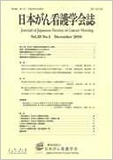Japanese
English
- 販売していません
- Abstract 文献概要
- 参考文献 Reference
要旨
本研究の目的は,セカンドオピニオンを受けた女性乳がん患者の初期治療選択過程を明らかにし,看護実践への示唆を得ることである.セカンドオピニオンを受けて初期治療選択をした女性乳がん患者24名を対象とし,半構造化面接にてデータ収集し,修正版グラウンデッド・セオリー・アプローチの手法を用いて分析した.その結果,患者の初期治療選択過程は,『疑念が拡がる』および『疑念が晴れる』をコアカテゴリーとする過程であった.【乳がんに命をもっていかれる】との危機感を抱いた患者は,【命と女性であることの価値を量る】【これまでの生活を維持できる治療法を模索する】〈氾濫した情報にのみこまれ収拾がつかない〉過程を経る一方,【この医師には命を託せない】【何も聞けず・わからず・解決できず】との過程を経る場合もあった.いずれの場合も【治療法選択の決め手が見つからない】ため〈他に頼る手段がない〉〈身近な人に勧められる〉ことで,セカンドオピニオンを求めた.セカンドオピニオンを受けた後【先の見通しが立ち腹をくくる】ことができ,【命と女性であることの価値を量る】【何も聞けず・わからず・解決できず】に戻る場合があるものの【医療者の力で混迷から脱却する】【合点のいく治療法を見つける】ことで治療法選択に至っていた.
これらから,セカンドオピニオンを受ける前に看護師による患者への面談を通して,セカンドオピニオンを求めた理由や過程の把握と,それに応じた支援,特に日常生活支援者として【これまでの生活を維持できる治療法を模索する】過程を支援する必要性が示唆された.
The purpose of this study was to clarify the process through which female patients with breast cancer who had obtained a second opinion made an initial treatment choice, and to obtain suggestions for nursing practice. Data was collected from twenty-four subjects using a semi-structured interview and analyzed using the modified grounded theory approach.
As a result, the process of initial treatment among the patients could be divided into two core categories: “doubts arising,” and “doubts being clarified.” At first, subjects experienced a crisis that “breast cancer will take their life,” then some underwent the stages of “questioning the value of life and the nature of womanhood,” “searching for information about a treatment to enable maintaining everyday life,” and “being overloaded with information and losing control.” At other times, subjects went through the stages of “not trusting this doctor” and “not being able to ask questions, understand anything, nor solve any problems.” Due to subjects experiencing “finding no decisive factors in making a treatment choice”, they reached the conclusion that “a second opinion is the only means” and through “being encouraged by surrounding people”, every patient decided to seek a second opinion. After receiving a second opinion, subjects experienced “being fully prepared because they understood clearly.” Although they sometimes went back to the stage of “questioning the value of life and the nature of womanhood,” and “not being able to ask questions, understand anything, nor solve any problems,” they eventually made a treatment choice by feeling “confusion removal through consultation with healthcare professionals” and “finding a satisfactory treatment.”
Results suggest that nurses need to understand the reasons why female patients with breast cancer seek a second opinion, and the process by which they receive it. Helping patients find a treatment that allows them to maintain their everyday routines is especially important. Due to their involvement in the patients' care on a day-to-day basis, nurses are in the best position to do so.
Copyright © 2016, Japanese Society of Cancer Nursing All rights reserved.


